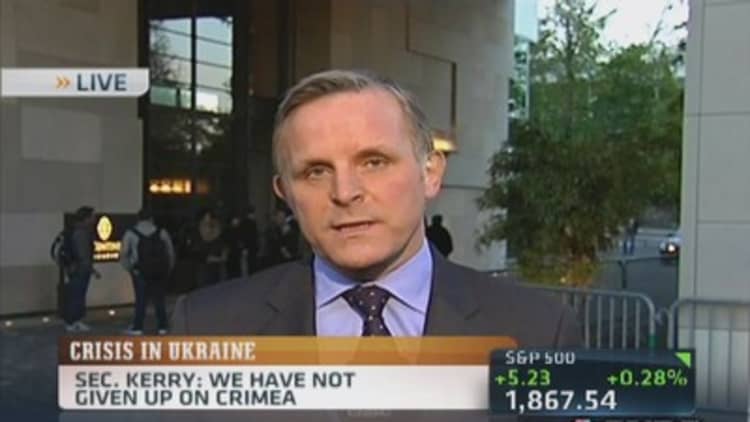The yen slipped to 10-day lows against the dollar on Friday after speculators unwound some safe-haven trades following upbeat U.S. economic data and on hopes for a diplomatic initiative seeking an end to violence in Ukraine.
The dollar traded at 102.39 yen, and has ticked up in the past five sessions from a three-week low of 101.32 yen.
Worries about tensions in the Ukraine, which have prompted some safe-haven buying of the yen, eased somewhat on Thursday after the United States, Russia, Ukraine and the European Union called for an immediate halt to violence.
Read MoreObama skeptical about progress in Ukraine
Further, U.S. data pointed to activity regaining momentum after disruptions due to harsh winter weather.
New claims for jobless benefits hovered near their pre-recession levels last week and manufacturing in the Mid-Atlantic region accelerated in April.
"There are signs of a pick-up in the U.S. economy markets have been long waiting for," said Shinichiro Kadota, chief forex strategist at Barclays Bank in Tokyo.
Trading is expected to be subdued on Friday, as many centers are closed for Easter, though Tokyo markets are open.
Read MoreGlobal growth to remain muted: Deutsche Post DHL CEO
The dollar has risen above the 38.2 percent retracement of its fall from its April peak of 104.13 yen, with next resistance seen at the 50 percent retracement of 102.73 yen.

The was at $1.3814, little changed over the past few sessions. It hit a 2-1/2 year high near $1.40 last month, and since then European Central Bank officials have tried to talk it down given concerns that a strong currency could derail the euro zone's fragile economic recovery.
The latest was Executive Board member Yves Mersch, who said a sustained appreciation in the euro would inevitably trigger a reaction from the ECB.
Read MoreCan Europe steal America's IPO crown?
Last weekend, ECB President Mario Draghi identified the euro's strength as a possible trigger for easing policy.
"The euro, if given the chance, tends to rise. The only really effective measure to counter the currency's strength would be quantitative easing," said Masafumi Yamamoto, market strategist at Praevidentia Strategy in Tokyo.
"The ECB will want see the European Supreme Court approve the Outright Monetary Transactions first before it adopts quantitative easing. This may not take place until September at the earliest, and it will likely try to buy time until then."
Outright Monetary Transactions (OMT) is the ECB's as-yet-unused "unlimited" bond-buying scheme, its flagship emergency measure against the euro zone's debt crisis.
The German court took the unprecedented decision in February to defer the ruling regarding the OMT's legality to the European Court of Justice in Strasbourg.
Sterling hit 4 1/2-year high of $1.6842 on Thursday, after better-than-expected UK jobless data bolstered expectations the Bank of England may have to raise interest rates earlier than its peers. On Friday it had eased back to $1.6785.

